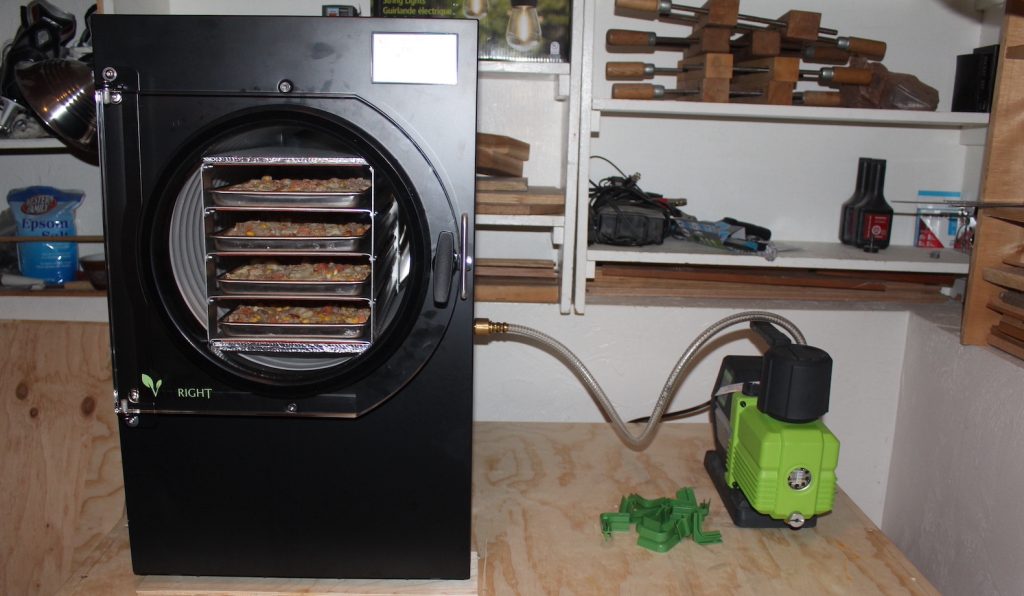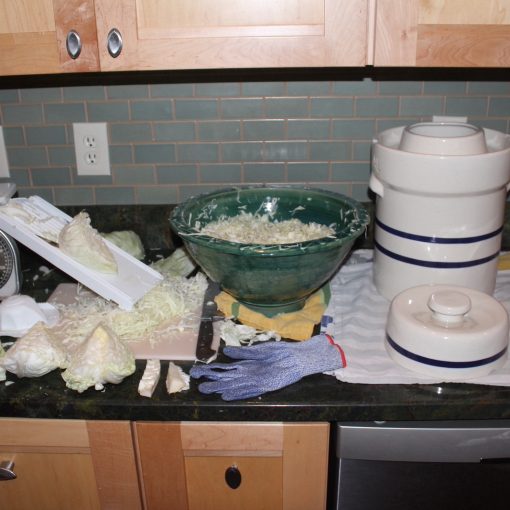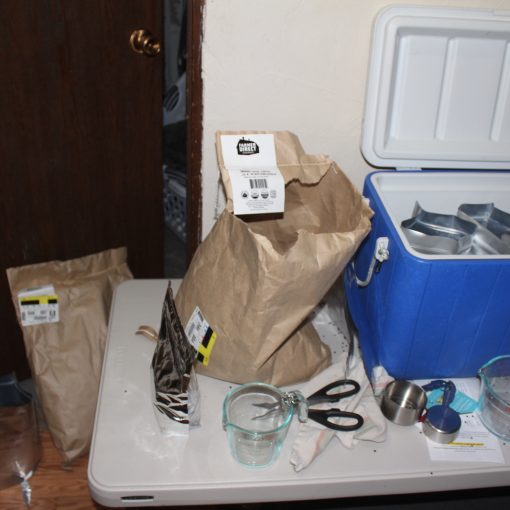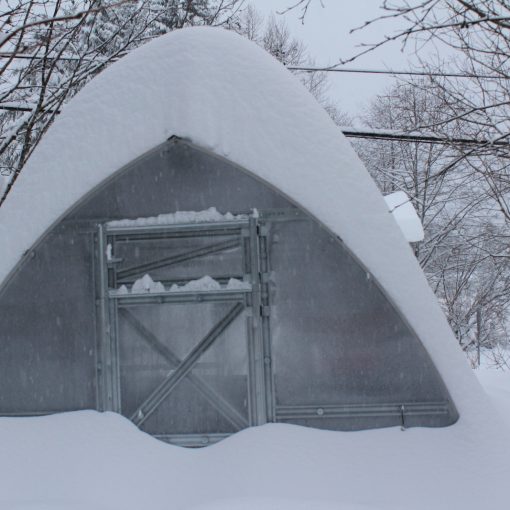Prepping for Strange Times: Freeze Dryer
If you don’t want to read the whole article, and are on the fence asking yourself, ‘Is a freeze dryer worth the money?’ The answer is yes—as long as you use it. Otherwise, it’s not. That’s all.

Harvest Right Home Freeze Dryer in Five Parts:*
Part 1. Is it worth it?
Part 2. How the Freeze Dryer works and choosing the right size for you.
Part 3. Taking the leap: Thinking about it: Ordering: Shipping: Set-up
Part 4. Best mylar bags (my opinion) and oxygen absorbers
Part 5. Some odds and ends that make life easier.
Part 1. Eggs and dairy: Why I bought a Home Freeze Dryer.
Here in Southeast Alaska over 95% of our food comes in by barge. Our town power supply generates from a hydro plant twenty miles away. That plant feeds four cables that run under a deep water inlet, then through miles of avalanche chutes. The back-up power supply is diesel generators. The fuel for those also comes in by barge.
What if the barges stopped for a year? What foods would we miss most that I can’t put up by more common food-storage like canning, fermenting, freezing, smoking, dehydrating. It was raw eggs for baking, and dairy products.
A medium HR freeze dryer has four trays. Each tray will comfortably hold a dozen eggs. Internet people may say they do 18 eggs per tray. Some of them will even post videos themselves spilling eggs all over the place. For me, four dozen eggs per batch is good. (I’ll talk about how to load them without spilling in Section 5: Odds and Ends). A tray of eggs comes out of the machine so dry it crumbles into powder between your fingers. Put the powder in mylar bags and it’s good for many years.
It’s true that raw eggs, dairy, and most other food keep in a chest freezer for a year, maybe two. Most of us have done it. It works but they take up the freezer space you may want to use for meat and fish. Then too, if a freezer’s all you’ve got, you’re putting all your eggs in one basket.
Old time means of preserving fresh raw eggs in the shell: water glassing, coating the shell with butter or mineral oil, etc. require unwashed eggs fresh from the chicken. I don’t keep chickens so that’s out. Anyway, they only last a fraction as long as freeze dried eggs do. Plus chickens tend to lay fewer eggs here in the northern winter.
Another method you may see on the internet for keeping raw eggs is drying them in a dehydrator. The Cooperative Extension says don’t do that (!) because a dehydrator doesn’t guarantee you a safe result. It’s also messy and people don’t seem to get much stored food for their effort.
About two tablespoons of freeze dried egg powder mixed with two tablespoons water equals an egg. You can freeze dry cooked scrambled eggs, too. I’d only do that if I planned to take them camping.
Freeze drying dairy, I use mostly half and half. Each tray of a medium freeze dryer holds a quart. So, a gallon per batch. People also freeze dry yogurt, ice cream, sour cream, cheese…
*Freeze dried food retains nutrients better than foods preserved by other methods.
*Once it’s rehydrated you can hardly tell it apart from fresh food: there are exceptions, like certain cheeses. They still work, especially in recipies. The texture’s a bit different is all.
*Partly because of the freeze dryer, this is the first year ever that I’ve got more food in the pantry going into spring than I had in the fall going into winter.
Advantages of freeze drying over chest freezers:
1) Even with a home generator to run your chest freezer in emergencies, if the power stays off long-term you’ll run out of fuel then you’re out of eggs. If you have to evacuate your home, be it for avalanche, hurricane, earthquake, wild fires…you’re not going to be there to mind the home generator anyway, and you’ll lose your food.
2) Well wrapped frozen food is usually good for 1 to 2 years vs. 20+ years for freeze dried food.
3) Most of us don’t keep a good inventory of what’s in the freezer. You seldom go all the way to the bottom where there could be a chicken hiding since the Clinton Administration.
4) We have a separate chest freezer for fish and spend summer filling it up. If you only have one freezer, and it’s loaded with fish, the fish smell can get into other foods.
Advantages of home freeze dryer over canning:
1) Freeze drying is way easier. You don’t have to watch it the whole time. Don’t have to adjust the heat, wash the jars, lug the pressure cooker around, and all that. With freeze drying, you just put whatever you’re going to freeze dry on the trays. Freeze the food in a chest freezer. [You don’t have to do this but freezing the trays first will cut your freeze drying time in the machine by hours]. When the trays are ready, press the touch screen to start the freeze dryer. It will tell you to wait 15 minutes while it’s cooling down. Then it will tell you to load the trays and close the drain valve. You do that, press continue. The machine does the rest.
2) Home footprint of freeze drying is smaller than canning. 60 empty quart mylar bags take up as much space as a hardback book.120 canning pint jars takes up about half-again the volume of a freeze drying machine and you have the same volume whether the jars are full or empty.
3) Far less weight: I’ve averaged about 10 cups of water taken out of each load of freeze dried food. That’s five pounds per load. If I do a hundred batches, then that food supply weighs 500 pounds less than fresh, frozen, or canned food (not even counting the weight of the canning jars).
4) If you drop 60 quart bags of freeze dried food, you just pick them up. Due to volume plus weight, most people wouldn’t pick up 60 quart jars (or 120 pints) of canned food at once but if they could, and they dropped them, that would be a big, fat mess. Same goes for if your shelves get knocked over by an earth quake. This is important if you have to leave the house in a hurry with enough food to last a few weeks.
5) My wife bought one of those glass top stoves. Manufacturers say you’re not supposed to pressure can on them. That’s because a big pressure canner builds up so much heat it can crack the glass stove top. For pressure canning, which is mostly fish around here, I set up a camp stove on the deck and can to my heart’s content. In a pinch I could get the whole set-up out there in the winter, but weather here being what it is, freeze drying is the way to go.
Advantages of a home freeze dryer over commercial ‘survival rations’:
Talked about this in a previous article, but it bears repeating:
1) Better food: You can put up wholesome food you choose for yourself, sourced from a farm/supplier you trust, seasoned the way you like, with no preservatives, no chemicals, no GMO’s, no TVP, etc.
2) More cost effective than buying ‘survival rations.’
3) You’re more likely to rotate your food supply.
If you haven’t been to the Harvest Right website, here ‘ts:
Next Up: Buying a freeze dryer. The trajectory
* In case you’re wondering, I don’t accept any kick-backs of any sort from Harvest Right or any other company mentioned in this series.



